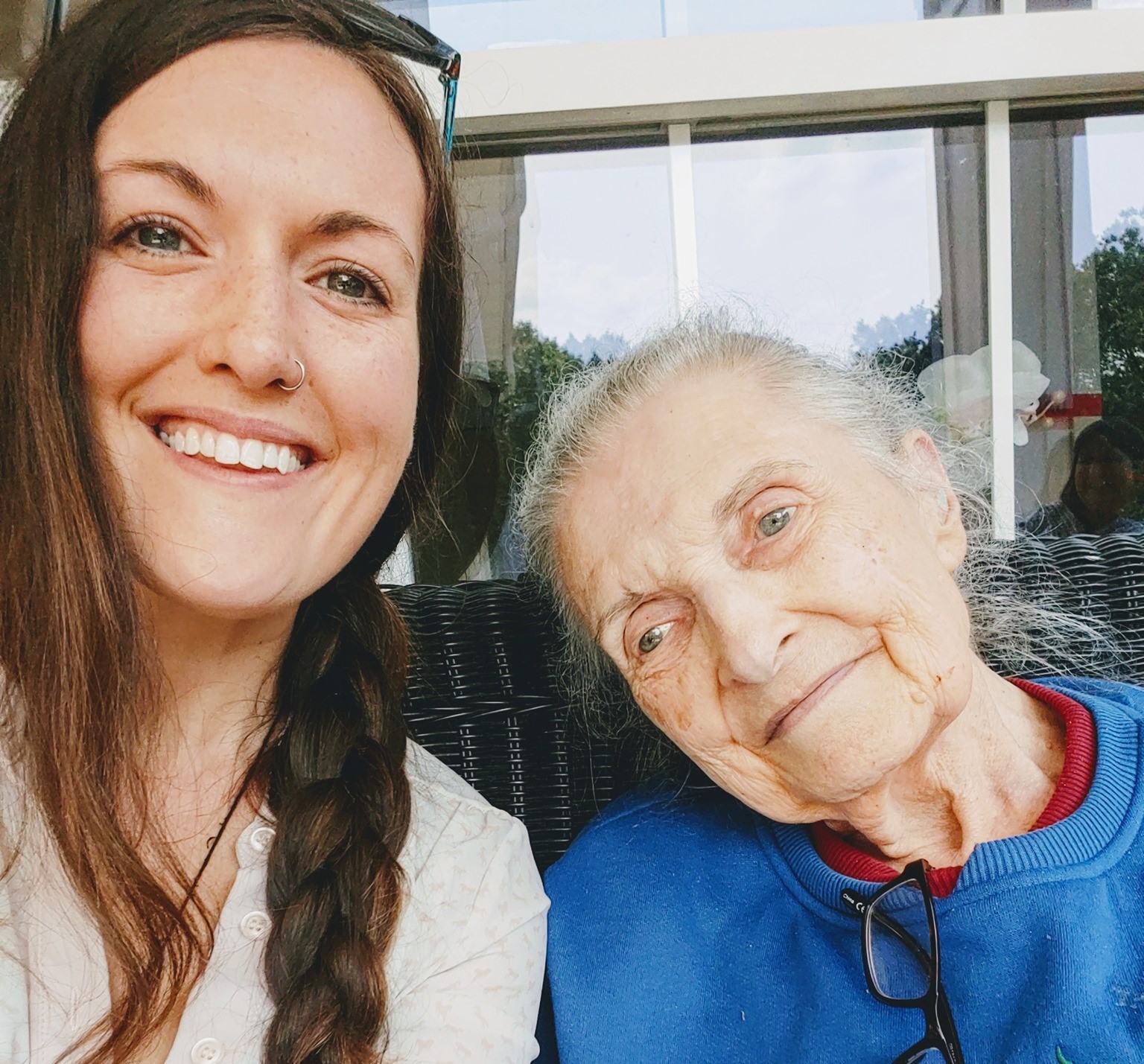“I love you, I love you, I love you…”
These were the last words I heard Nana speak before taking her final breath as she squeezed my hand. There isn’t a day that goes by that I don’t feel eternally lucky, being present for her death. One of the many gifts Nana passed along to me.
We had a special bond, interwoven through space, time, and DNA. We communicated through glances and sighs, always seeming to know what the other one meant when we’d pick at our fingernails or tap our foot a little too fast. Nana said I was just like her… and I always knew she needed that.
Looking back, it seems as if I was born to care for Nana, and vice versa. At 6 years old, I called 911 and calmly explained to the nice operator that my Nana’s chest hurt and she couldn’t speak. I don’t know what compelled me to walk away from the TV to the back room where I found Nana struggling to breathe, but I’m glad I did. She’d call my mom up in the middle of the night at random to tell her she felt I wasn’t doing well throughout my teens… she’d always be right.
Nana had a heart condition. She called it a “weak heart,” the doctors called it mitral valve disease. I always suspected her heart was just too large for this world. She felt big feelings and loved hard. We both had a fear of being misunderstood. I think that’s why I was the one that could communicate with her, even through the shifts of dementia. She felt safe with me.
I took a break from my job to take over more of the daily caretaking. I became Nana’s “chauffeur” as she liked to call me. I took her on trips to the grocery, the pharmacy, the library, and an endless cycle of doctor appointments. Once, I joined her in an x-ray to help her feel comfortable. She’d tease me halfway to visits, saying I had made her late so we might as well blow this one off and get a cocktail instead! Humor eased her anxiety. She was a proud woman who always put on a good face in public, sometimes at a great expense. Nana was known to take long naps after social interaction, something I understood.
Vascular dementia took us by surprise. One day Nana didn’t recognize my mom and she was
convinced Papa, her husband, was an imposter. But when I held her hand, she still found comfort. I knew her body language and was able to read her comfort level during doctor visits, followed by more and more frequent emergency room trips. Navigating the noisy, bright waiting rooms with unfamiliar faces was hard for Nana. She felt comfortable asking me things when she didn’t understand what was going on because I was never bothered to slow down to her pace. Many of those waiting room conversations are now among my favorite memories of her.
I didn’t mind repeating myself. I knew what it felt like to need more explanation from time to time. Nana and I shared a sense of feeling “too much” for this world sometimes, and that can make asking for help difficult. I knew when she needed space instead of crowding or when she needed her hair pulled off her face. I knew when she didn’t like the food they served her, so I snuck in apple hand pies and a chocolate Frosty from Wendy’s… I knew when she needed her hand held. I knew her. It’s always the little things that matter most. I don’t think that ever changes.
Nana was always quite blunt with me in private. This continued until the very end. We had countless conversations about her desire to be back in her hometown, Boston. To see the ocean, one last time, and to move back into her home in Greensboro, NC. Ultimately we had to move Nana and Papa to an assisted living facility. Nana had a hard time adjusting to a new space and wanted us there with her as much as possible. Home was everything to Nana so even though we weren’t able to move her back, we kept the familiar items around that brought her comfort. Books were her greatest comfort, so her chair was always placed by the bookshelf, where she was happiest.
Caring for Nana came naturally to me and gave me great purpose. I paid attention to her, and that made all the difference. In slowing down to be a caretaker for Nana, I learned how to slow down and pay attention to my needs as well. It was not always easy for me, but I took time for daily walks in nature to relax. Intentionally carving out space for myself each day, even if it was just 10 minutes, was essential to my mental health and overall wellness. Nana was right, I am just like her, and she knew I needed that.
I love you, I love you, I love you.
Want to keep connected to The Conversation Project? Sign-up for our newsletter(s), follow us on social media (Twitter, Facebook, Instagram), download our conversation starter resources and feel free to reach us at ConversationProject@ihi.org.


In every quiet moment I held her hand, I understood: love isn’t about grand gestures, but knowing the cadence of someone’s breath, the weight of their silence, the shape of their longing. When the world became unfamiliar, she still found me. And even when she couldn’t remember names, she remembered love.